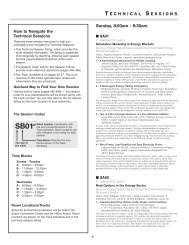Sunday
Sunday
Sunday
Create successful ePaper yourself
Turn your PDF publications into a flip-book with our unique Google optimized e-Paper software.
SB36<br />
3 - Survey of Dynamic Pricing Research on Selling a Given<br />
Inventory over a Finite Horizon<br />
Ming Chen, Assistant Professor, California State University,<br />
School of Business Administration, Long Beach, CA, 90840,<br />
United States of America, Ming.Chen@csulb.edu<br />
We present a review of existing research on dynamic pricing problems involve<br />
selling a given amount of inventory over a finite time horizon without inventory<br />
replenishment. We classify these problems into several classes based on a number<br />
of problem attributes and summarize main findings and managerial insights.<br />
■ SB36<br />
36- North 225 B- CC<br />
New Directions in Revenue Management<br />
Sponsor: Revenue Management & Pricing<br />
Sponsored Session<br />
Chair: Omar Besbes, Columbia Business School, 3022 Broadway,<br />
New York, NY, 10027, United States of America, ob2105@columbia.edu<br />
Co-Chair: Gabriel Weintraub, Columbia Business School, 3022<br />
Broadway, New York, NY, 10027, United States of America,<br />
gyw2105@columbia.edu<br />
1 - Intertemporal Price Discrimination: Structure and Computation<br />
of Optimal Policies<br />
Ilan Lobel, New York University, Stern Business, 44 W 4th St.,<br />
New York, NY, United States of America, ilobel@stern.nyu.edu,<br />
Omar Besbes<br />
We consider the problem of a firm selling goods over time to customers with<br />
heterogeneous patience levels. We let customer valuations be correlated with<br />
their willingness-to-wait and look for a dynamic pricing policy that maximizes the<br />
long-term revenue of the firm. We prove several structural properties of the<br />
optimal pricing policy and develop a dynamic programming algorithm that<br />
computes the optimal policy in polynomial time.<br />
2 - ADP For (Very) High Dimensional Resource Allocation<br />
Vivek Farias, Massachusetts Institute of Technology, 77<br />
Massachusetts Avenue, Cambridge, MA, United States of America,<br />
vivekf@mit.edu, Dragos Florin Ciocan<br />
Due to the heterogeneous nature of the resource being allocated (impressions),<br />
online Ad Display allocation presents a challenge to traditional revenue<br />
management approaches. We present a novel ADP inspired clustering technique<br />
that allows for real time resource allocation in such problems. Since this scheme is<br />
calibrated through solving a natural, but massive linear program, we also deploy a<br />
scheme that can solve effectively arbitrarily large LPs in a decentralized manner.<br />
3 - Optimal Timing of New Product Introduction using Preliminary<br />
Market Testing<br />
Rene Caldentey, New York University, 44 West Fourth Street,<br />
New York, NY, United States of America, rcaldent@stern.nyu.edu,<br />
Victor Araman<br />
Introducing new products into the marketplace is a risky bet that manufacturers<br />
must continuously take. As a result, it is not uncommon to witness major<br />
manufacturers discontinuing a product shortly after its introduction. In this talk,<br />
we consider a seller who first tests the market and learns more about the demand<br />
before deciding whether or not to launch a product (or set of products). We also<br />
discuss current e-commerce practices that have increase companies’ ability to do<br />
such market testing.<br />
4 - Auctions Design for Online Display Advertising Exchanges<br />
Santiago Balseiro, Columbia Business School,<br />
3022 Broadway, New York, NY, 10027, United States of America,<br />
srb2155@columbia.edu, Omar Besbes, Gabriel Weintraub<br />
Ad Exchanges are emerging markets where advertisers may purchase display ad<br />
placements directly from publishers via a simple auction mechanism. Using the<br />
novel notion of a Fluid Mean Field Equilibrium we study key auction design<br />
decisions that publishers face in these markets. In particular, we provide sharp<br />
prescriptions regarding the reserve price, the allocation of impressions to the<br />
exchange versus an alternative channel, and the disclosure of viewers’<br />
information.<br />
INFORMS Phoenix – 2012<br />
92<br />
■ SB37<br />
37- North 226 A- CC<br />
Dynamic Pricing in Supply Chains<br />
Sponsor: Revenue Management & Pricing<br />
Sponsored Session<br />
Chair: Jian Li, Assistant Professor, Northeastern Illinois University,<br />
5500 N. St. Louis Ave, Chicago, IL, 60625, United States of America,<br />
j-li3@neiu.edu<br />
1 - The Inventory Billboard Effect on Information Sharing in<br />
Competing Supply Chains<br />
Zhengping Wu, Assistant Professor, Singapore Management<br />
University, 50 Stamford Road, Singapore, Singapore,<br />
zpwu@smu.edu.sg, Rong Li, Xin Wei<br />
The inventory billboard effect in operations management indicates that the<br />
increasing shelf-space allocated to a product has a positive effect on the product<br />
demand. This paper studies the billboard effect on the vertical information sharing<br />
strategy of competing supply chains in an environment with production<br />
diseconomies. We analyze how equilibrium information sharing strategy,<br />
wholesale price and retail quantity are affected by the billboard effect coefficient.<br />
2 - Price Trends in Dynamic Pricing Models<br />
Xiaowei Xu, Associate Professor, Rutgers Business School,<br />
1 Washington Park, Room 958, Newark, NJ, 07102-3122,<br />
United States of America, xiaoweix@business.rutgers.edu<br />
We consider a seller that has a limited amount of asset to liquidate in a finite time<br />
horizon. Demand signals are updated at preset time spots and the seller can adjust<br />
the product price accordingly. We offer the managerial insights of how<br />
probabilistic price trends are affected by time-varying and price-sensitive demand<br />
forms via exploring the recursive structure of the optimal pricing policy and the<br />
implied martingale decomposition.<br />
3 - Dynamic Pricing with Random Replenishment Capacity<br />
Jian Li, Assistant Professor, Northeastern Illinois University,<br />
5500 N. St. Louis Ave., Chicago, IL, 60625,<br />
United States of America, j-li3@neiu.edu, Xiaowei Xu<br />
In this research, we study the decision problem facing a retailer who sells a short<br />
seasonal product inventory in a stylized model. The retailer has an uncertain<br />
second chance to refill its inventory. We analytically derive the structure of the<br />
optimal dynamic pricing policy and procurement decisions. We also explore the<br />
properties of the optimal dynamic pricing and the expected profit function.<br />
■ SB38<br />
38- North 226 B- CC<br />
Service Innovations in the Global Marketplace<br />
Sponsor: Service Science<br />
Sponsored Session<br />
Chair: Christian Wernz, Assistant Professor, Virginia Tech, 205 Durham<br />
Hall (0118), Blacksburg, VA, 24061, United States of America,<br />
cwernz@vt.edu<br />
1 - Service Engineering – Trends, Perspectives and the<br />
Contribution to Service Science<br />
Walter Ganz, Director, Fraunhofer IAO, Nobelstr. 12, Stuttgart,<br />
70569, Germany, Walter.Ganz@iao.fraunhofer.de, Thomas Meiren<br />
A large amount of work has been done in relation to the definitions, typologies of<br />
services. It is noticeable that the development of fundamental models for services<br />
has tended to be neglected. Discussing the options of model creation as well as the<br />
simulation of services was a central topic of our expert study “MARS”. It becomes<br />
obvious that the creation of models as well as simulation has gained an<br />
importance within the last years and it could make a relevant contribution for<br />
Service Science<br />
2 - Firm Value of Product Innovation in Service Ecosystems:<br />
A Study of Smartphones<br />
Rahul Basole, Associate Director and Senior Research Scientist,<br />
Tennenbaum Institute, Georgia Institute of Technology, 75 Fifth<br />
Street NW, Suite 600, Atlanta, GA, 30308, United States of<br />
America, rahul.basole@ti.gatech.edu, Hyunwoo Park<br />
We examine the asymmetric impact of product innovation on the market value of<br />
manufacturers (e.g. device manufacturers) and service providers (e.g. mobile<br />
network operators) in the mobile service ecosystem. Our analysis is based on a<br />
comprehensive dataset comprising over 1,500 smartphones and considers the<br />
influence of product characteristics, the frequency and timing of product<br />
innovation, and the network structure of the service ecosystem. Theoretical and<br />
managerial implications are discussed.



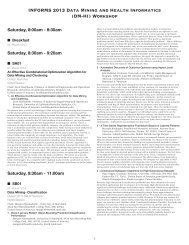
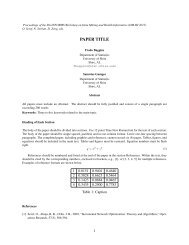
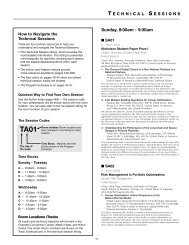
![[PDF] Charlotte Back Matter](https://img.yumpu.com/17933057/1/190x245/pdf-charlotte-back-matter.jpg?quality=85)
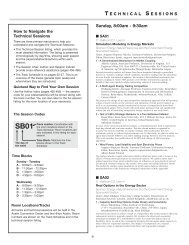
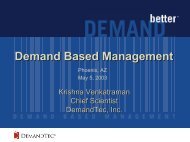
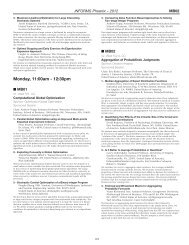
![[PDF] ALIO Back Matter](https://img.yumpu.com/17932960/1/190x245/pdf-alio-back-matter.jpg?quality=85)

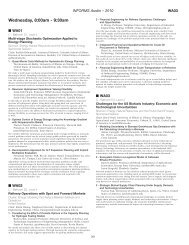
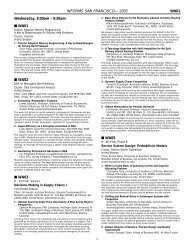
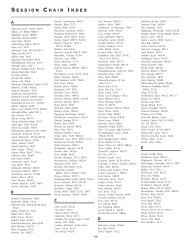
![[PDF] Monday, 8:00am - 9:30am](https://img.yumpu.com/17932954/1/190x245/pdf-monday-800am-930am.jpg?quality=85)
